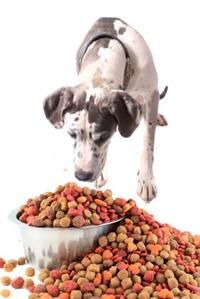Tips for Keeping a Pet's Digestive Tract Healthy

The digestive system breaks down food and turns it into needed nutrients. An animal’s lifestyle and the food that it eats directly impact its digestive health. The following tips can provide clients with information when making decisions on keeping their pet’s digestive tract healthy.
Diet
- Food choices for dogs and cats are abundant, and staff should be aware of product possibilities in order to direct clients to the type of food that will suit the needs of their pets.
- Inform clients that healthy foods offer ingredients to maintain healthy digestion.
- Most pet food companies add vitamins and minerals to their food products.
- These food added ingredients enhance the digestive tract health by allowing absorption of vitamins and minerals, such as:
- Beet pulp - good fiber source and aids in absorption
- Grain sorghum and barley – provides energy and enhances digestibility
- Prebiotics – ingredients that promote natural gut bacteria
- Veterinarian prescribed diet formulas are available when an animal exhibits continuous digestive problems.
- Some animals benefit from a prescription formula for a short time and then can go back to their regular diet.
- Some may need to remain on the prescription formula for the rest of their life.
- Vitamin, mineral, and probiotic food supplements are also available to enhance the digestive system.
Water
- Explain to clients that a common cause for issues with the digestive tract is the failure to drink enough water.
- Mild dehydration causes water to be withdrawn from the colon, which dehydrates the feces and can cause constipation.
- Advise clients that cleaned and filled water bowls should be available at all times.
Treats
- Help clients be aware to look at the nutritional value in the treats they give their animals and advise them that treats can be healthy when given in the proper amount.
- Inform clients that a different type of balanced pet food can also be used as a treat, if it is something new to the animal they will enjoy it.
- Discuss the amount and kind of table scraps in an animal’s diet--as some may benefit while some may actually harm--and advise that if the human food is not a part of a healthy diet then it should be avoided.
Exercise
- In order for a pet to be overall healthy and fit, it needs exercise.
- Exercise tones muscles and protects from diseases.
- Exercise plays an important role in keeping the digestive tract healthy and strong.
- Without exercise, digestive tract issues may arise, such as:
- Gastrointestinal problems
- Acid reflux
- Obesity
- Constipation
Digestive Tract Detection in Pets
- Check its poop! Watch the animal to see if they have to strain to eliminate a stool or if their stool is soft with no form.
- Stools that are too hard or too soft may be signs that the animal is either not absorbing food nutrients properly, or that the food is lacking the proper nutrients that keep the digestive tract healthy.
- Inform clients that continuous problems with elimination, vomiting, or blood in the stool may indicate something more serious than improper digestion and their pet needs to be examined.
Giving clients the information they need in order to make good decisions regarding their pet’s lifestyle and eating habits may directly impact the health of the animal’s digestive tract.
Careers
Are you looking for a place to let your talents shine? At Covetrus, we help our practitioner customers better serve their patients and take pride in providing the best customer experience possible. Search our open positions to see our available opportunities.
Newsletter
Stay current with what’s going on with Covetrus, subscribe to receive our newsletter and email communications. Subscribers will receive the latest information in practice management, sales and marketing, animal health, and more.


Leave a comment